|
|
|
Sort Order |
|
|
|
Items / Page
|
|
|
|
|
|
|
| Srl | Item |
| 1 |
ID:
166148
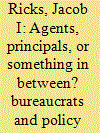

|
|
|
|
|
| Summary/Abstract |
In the aftermath of the 2006 and 2014 Thai coups, observers declared the resurrection of the bureaucratic polity. Bureaucrats, though, remained influential even during the period of 1992–2006, when elected politicians were thought to command the Thai state. Bureaucratic involvement in politics poses a challenge for dominant political science theories of politician–bureaucrat relationships, which draw heavily from principal–agent frameworks. I apply agency theory to Thailand, testing three different hypotheses derived from the theory. Examining legislative productivity and control over bureaucratic career trajectories, I find that elected politicians increasingly acted as principals of the Thai state from 1992 through 2006, and to a lesser degree from 2008 to 2013. Thai bureaucrats, though, have frequently engaged in the political sphere, blunting political oversight and expanding their independence vis-à-vis politicians. This suggests that the principal–agent model overlooks the range of resources that bureaucracies can bring to bear in developing countries, granting them greater autonomy than anticipated. As such, theories of the politician–bureaucrat relationship in developing states need to better account for the mechanisms through which bureaucrats exercise policy discretion and political influence.
|
|
|
|
|
|
|
|
|
|
|
|
|
|
|
|
| 2 |
ID:
160467
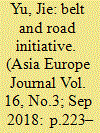

|
|
|
|
|
| Summary/Abstract |
This article explores the linkages between domestic affairs and foreign policies in China in fulfilling its grand ambition of Belt and Road Initiative (BRI). It examines the complexities in decision-making process of “BRI” inside Beijing’s administration. It departs from the most existing literature on BRI in Europe, which focus upon the geo-economic and geo-political impacts of the BRI. Instead, it adopts an “inside-out” approach by examining the actual policy process with a primary focus to individual actors such as the Party, the government department and the state-owned enterprises as well as individual academics. It also disentangles the intricate relations amongst the Party, the key decision-making institutions and the policy execution entities in determining the final outcome of the BRI. It will finally reflect the extent to which Beijing’s bureaucratic complexities have impacted upon the EU and its member states’ willingness in collaborating or in formally endorsing China’s BRI.
|
|
|
|
|
|
|
|
|
|
|
|
|
|
|
|
| 3 |
ID:
185023


|
|
|
|
|
| Summary/Abstract |
Research on the welfare state has devoted considerable attention to social policy expansion. However, little is known about why governments expand social policies serving groups with limited power on issues with low visibility. I call these “benevolent policies.” This class of social policies improves population well-being but produces minimal political gains for the governments enacting them. Why do governments expand benevolent policies if political incentives for reform are weak? I investigate this question by focusing on government responses to malnutrition. Drawing on nine months of fieldwork, including 71 interviews, I argue that the origins of policy expansion can be found in the government bureaucracy. Bureaucrats with technical expertise—technocrats—can play a defining role, deploying international pressure to court executive support and orchestrate policy change. Their actions help explain the Indonesian government’s unexpected expansion of nutrition policies, which serve low-income women and children and address micronutrient malnutrition.
|
|
|
|
|
|
|
|
|
|
|
|
|
|
|
|
| 4 |
ID:
149800
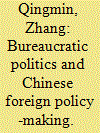

|
|
|
|
|
| Summary/Abstract |
This article tries to bridge the bureaucratic politics model of foreign policy analysis (FPA), which is based on American foreign policy practice, and Chinese foreign policy studies. It traces the development and discusses the Chinese features of the bureaucratic politics model, and analyses the evolving bureaucratic political process of Chinese foreign policy-making. Its conclusion is that the foreign policy-making process of the People’s Republic of China (PRC) has progressed from ideology-based ‘line battles’ to personal relationship (guanxi)-based in-party competition, and from factional competition under one paramount leader to government politics wherein many participants vie for different policies. As China integrates more deeply into the international community, and communist ideology loses its political validity in Chinese politics, bureaucratic politics in China exhibits more prominent Chinese cultural features, and at the same time shares greater similarities with the bureaucratic politics in western democratic countries. Therefore, to avoid rigidity, attention must be paid to variances in bureaucratic politics as applied in the Chinese context. Bridging FPA theory and Chinese foreign studies is hence both viable and beneficial for the construction of FPA theories beyond the United States and for China’s foreign policy research.
|
|
|
|
|
|
|
|
|
|
|
|
|
|
|
|
| 5 |
ID:
088102


|
|
|
|
|
| Publication |
Washington, D C, Brookings Institution, 1974.
|
| Description |
xvii, 340p.
|
|
|
|
|
|
|
|
|
|
|
|
Copies: C:1/I:0,R:0,Q:0
Circulation
| Accession# | Call# | Current Location | Status | Policy | Location |
| 034187 | 353.00892/HAL 034187 | Main | On Shelf | General | |
|
|
|
|
| 6 |
ID:
161974
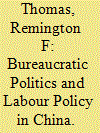

|
|
|
|
|
| Summary/Abstract |
Historical institutionalism has demonstrated the value of close analysis of policymaking to illuminate the relationship between institutional change and policy outcomes. This article emphasises the importance of the institutional setting in which state agencies in an authoritarian regime shape the agenda for choice, resolve disagreements and implement decisions. It outlines a model of policymaking and policy implementation in the sphere of labour relations in China by examining these three issue areas: enforcement of labour contract legislation, technical and vocational education and training (TVET) and pension reform. In all three, policymaking reflects the interaction of state entities, with minimal participation by non-state actors. However, in China, more than in other post-communist countries, political authority is dispersed across state bodies with overlapping responsibilities and levels of the administrative hierarchy. As a result, new policy initiatives tend to be “layered” on top of older ones rather than displacing them, and implementation tends to be hampered by jurisdictional competition and diverging bureaucratic policy preferences. This pattern helps account for the pattern of incremental change and weak implementation.
|
|
|
|
|
|
|
|
|
|
|
|
|
|
|
|
| 7 |
ID:
143282
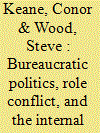

|
|
|
|
|
| Summary/Abstract |
Among the many challenges confronting the United States and its allies in Afghanistan were cohesion and communication problems in state-building programs. Merging role theory and bureaucratic politics approaches, this article argues that US Provincial Reconstruction Teams (PRTs), the composite groups charged with implementing these programs, suffered from incompatibilities between sectors of government, among which the military was dominant. US PRTs were affected by role conflict, resulting from varying and often competing organizational cultures with divergent role conceptions.
|
|
|
|
|
|
|
|
|
|
|
|
|
|
|
|
| 8 |
ID:
065702
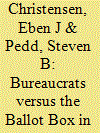

|
|
|
| 9 |
ID:
112750


|
|
|
|
|
| Publication |
2012.
|
| Summary/Abstract |
Defying a 2003 agreement to halt its nuclear program, Iran resumed its nuclear
activities in 2005 despite the objections and sanctions of a concerned international
community. Theoretical frameworks in international relations may suggest the
strategic environment, regime type, and international institutions as key variables
to explain foreign policy-making. In this article, it is argued that nuclear decisionmaking in Tehran cannot be understood through a "black-box" model that would
assume Iran to be a unitary rational actor that knows its capabilities, interests, and
wants. Instead, one must investigate the changes in the domestic decision-making
and bargaining process through a bureaucratic politics model. Although some
point out hardliner President Ahmadinejad as the sole decision-maker, we argue
that a single individual could not have changed the course of the entire country;
there were coalitions and struggles among multiple actors within the regime.
Analyzing two different eras within the case of Iran, we argue that the shift in
bureaucratic coalitions among the Supreme Leader, the President, the Revolutionary
Guards, the Atomic Energy Agency of Iran, and the Supreme National Security
Council explains the shift in Iranian foreign policy. In our conclusion, we draw
several implications of this argument for the scholarly literature and offer policyprescriptive advice.
|
|
|
|
|
|
|
|
|
|
|
|
|
|
|
|
| 10 |
ID:
134079
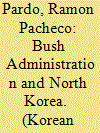

|
|
|
|
|
| Publication |
2014.
|
| Summary/Abstract |
Why did the George W. Bush Administration change its policy toward North Korea from confrontation to accommodation during the second nuclear crisis? This article answers the question by analyzing how and why a coalition-including Bush Administration doves, China, Russia, South Korea and, at times, Japan and North Korea-worked together to overcome the reticence of Bush Administration hawks to engage with Pyongyang. Building on the soft balancing, bureaucratic politics, and transgovernmental coalitions literature, this article explains how the Six-Party Talks served this coalition to understand the extent to which they shared goals and policies. Aware of the divisions within the Bush Administration regarding policy toward North Korea, the five other parties to the talks were able to undermine the preferred policies of U.S. hawks while supporting the policies of doves. Thus, rather than determining Washington's behavior, this coalition laid the ground for U.S. officials supportive of accommodation to upload their preferences into official Bush Administration's policy. This article therefore also sheds light on how soft balancing can be used by third parties to influence the decision-making process in the United States.
|
|
|
|
|
|
|
|
|
|
|
|
|
|
|
|
| 11 |
ID:
168282
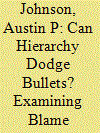

|
|
|
|
|
| Summary/Abstract |
The increased outsourcing of national security endeavors to private military companies (PMCs) raises questions concerning public evaluations of their performance and the extent to which government officials are held accountable. We use a survey experiment to test public blame attribution associated with a failed military operation that was conducted by either regular or private military personnel. Our findings suggest that there are multiple mediating pathways in the process of attributing blame in foreign policy. Furthermore, our findings suggest that contracting out military functions to a PMC can damage perceptions of performance, perhaps increasing blame attribution by the public. These impacts on the attribution of blame suggest that PMCs are viewed as inferior service providers by the mass public and politicians will be held accountable, directly or indirectly. Implications from our study add to the discussion on the outsourcing of military capacities which are rapidly expanding in the Western world.
|
|
|
|
|
|
|
|
|
|
|
|
|
|
|
|
| 12 |
ID:
093627


|
|
|
|
|
| Publication |
2009.
|
| Summary/Abstract |
Canada's 2005 International Policy Statement announced that the Department of Foreign Affairs and International Trade and the Department of National Defence and the Canadian Forces were committed to "whole of government" interventions in failed and fragile states. This led both the Canadian government and outside observers to declare that Canada was successfully harmonising the aims and practices of its internationally focused departments and crafting a synergised approach to interventions in failed and fragile states. Drawing on Halperin and Clapp's organisational theory of bureaucratic politics, this paper argues instead that the foreign affairs and defence departments embraced the idea of failed and fragile states to reinforce their organisational essences and recycle their existing missions, roles, and capabilities. In addition, the departments used a "whole of government" approach to secure their autonomy, fence their respective functions, and enlarge their unique capabilities, under the guise of greater efficiency.
|
|
|
|
|
|
|
|
|
|
|
|
|
|
|
|
| 13 |
ID:
148393
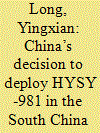

|
|
|
|
|
| Summary/Abstract |
This article sheds light on developing a hybrid analytical construct by combining Foreign Policy Analysis (FPA) theory and modifications tailored to the case of China. It employs the bureaucratic politics model to China’s decision making during the China–Vietnam standoff in 2014 and adjusts the traditional model with intervening variable – the party ranking system and Democratic Centralism doctrine. I argue that the bargaining game among different actors who have diverse agendas led to the shift in China’s strategy. It would concurrently advance FPA studies while developing a future avenue for research on foreign policy formulation of China.
|
|
|
|
|
|
|
|
|
|
|
|
|
|
|
|
| 14 |
ID:
140280


|
|
|
|
|
| Summary/Abstract |
One of the shortcomings of foreign policy role theory is its tendency to black-box the state. Role theorists often assume a national role conception, without paying too much attention to the domestic political processes regarding how a role is selected to represent the state out of a number of potential competing roles. We develop a model of role contestation and role selection that draws on existing knowledge of foreign policy creation resulting from competition between governing elites and opposition, multi-party coalitions, cabinet dynamics, and bureaucratic politics. We incorporate expectations from role theory to explain how conflict over role selection may be resolved. The model is examined in light of several cases in immediate post-war Germany. We find that government and opposition dynamics are the primary sources of contestation over NRCs in our cases, some evidence for bureaucratic politics, and little evidence that coalition politics was at play. Finally, there were few instances in which role conflict resolution mechanisms were used.
|
|
|
|
|
|
|
|
|
|
|
|
|
|
|
|
| 15 |
ID:
177739
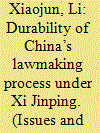

|
|
|
|
|
| Summary/Abstract |
Investment Law (FIL) after a short deliberation period of only three months. This expedited legislative process seems unusual, considering that the original draft of the FIL proposed by the Ministry of Commerce in January 2015 was tabled indefinitely after a brief period of public consultation. How can we explain this stark difference? Comparing the legislative processes and contents of the two laws, this paper shows that, as with many previous laws, bureaucratic politics likely contributed to an impasse in the 2015 draft, whereas external shocks—in this case, the escalating trade war between China and the United States—helped accelerate the deliberation process and the passage of the new FIL. These two cases demonstrate the durability of lawmaking institutions and procedures under Xi Jinping despite the recentralization of power in the executive after changes to the constitution.
|
|
|
|
|
|
|
|
|
|
|
|
|
|
|
|
| 16 |
ID:
131670
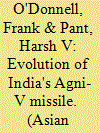

|
|
|
|
|
| Publication |
2014.
|
| Summary/Abstract |
India's Agni-V missile test of April 2012 opens new questions as to India's intentions. This article investigates three principal bureaucratic determinants of Indian military nuclear policy. Greater control over policymaking is required from the Prime Minister's Office to resolve governance questions surrounding India's nuclear policy.
|
|
|
|
|
|
|
|
|
|
|
|
|
|
|
|
| 17 |
ID:
142087
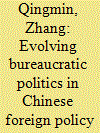

|
|
|
|
|
| Summary/Abstract |
Growing economically more powerful and confident, China is exerting unprecedented influence on global affairs. But the diverse voices and sometimes inconsistencies in its foreign policy behavior have confused many China watchers. Such phenomena demonstrate some new trends in Chinese foreign policy. In order to unveil such trends, this paper intends to look at Chinese foreign policy practices by employing the theoretical framework of bureaucratic politics. Its conclusion is that the foreign policy-making process of the People’s Republic of China (PRC) has progressed from the ideology based in-party factionalism of “line battles” to interest-based government politics of organizational competition. The early stage has distinctive Chinese characteristics, which are different from Western bureaucratic politics. But as Chinese society becomes more diversified, the bureaucratic politics in China begins to share more similarities with those in the Western democracies. Such trends render the application of Foreign Policy Analysis (FPA) to the research of Chinese foreign policymaking both necessary and beneficial to the construction of theories of foreign policy analysis, as well as research on China’s foreign policy itself.
|
|
|
|
|
|
|
|
|
|
|
|
|
|
|
|
| 18 |
ID:
120591
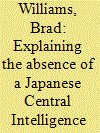

|
|
|
|
|
| Publication |
2013.
|
| Summary/Abstract |
I examine a relatively underexplored aspect of Japan's early postwar history and seek to explain why attempts to establish a Japanese-style central intelligence agency (JCIA) in the 1950s were unsuccessful. I evaluate three competing explanations drawn from the level of international politics, focusing on US power resources and influence as well as liberal and constructivist styles of analysis-alliance politics, sectionalism, and the norm of antimilitarism-in order to shed light on the historical origins of Japan's intelligence apparatus, which is relatively underdeveloped and underfunded compared to other middle powers. It highlights the primacy of domestic factors over structural causes in explaining the decision not to establish a JCIA. In particular, I argue that the JCIA proposal failed primarily because of attacks on important proponents that, while sometimes driven by seemingly rational organizational interests, were nevertheless legitimated by growing antimilitaristic sentiments shared by elites from the political center to the left of the ideological spectrum. The newly emerging norm of antimilitarism was predicated largely on a fear of constraints on recently acquired civil and political liberties. These fears, manifested most prominently in vocal Diet and media opposition, were compounded by the norm of secrecy-an important element of intelligence activities-which served to heighten further speculation about the malign intent of postwar Japan's reconstituted intelligence system.
|
|
|
|
|
|
|
|
|
|
|
|
|
|
|
|
| 19 |
ID:
192112


|
|
|
|
|
| Summary/Abstract |
Whilst China’s increasing foreign aid in education to Africa, its soft power remains insufficient. ‘Telling China’s story well’ attributes the lack of soft power to inadequate communication. This article argues that the ‘story’ rather than ‘telling’ matters. It reveals that the education-for-economic development paradigm adopted by the Ministry of Commerce and the Ministry of Education’s reluctance toward Africa jointly shape China’s ineffective practice in the international discourse. Institutional changes since 2018 can hardly alter this bureaucratic divide as the imbalanced capacity of China’s economy and education remains. This article contributes to bureaucratic politics in foreign policymaking by identifying ministerial influences subject to their relevance to foreign policy rather than their occupancy of resources in the issue area.
|
|
|
|
|
|
|
|
|
|
|
|
|
|
|
|
| 20 |
ID:
099314
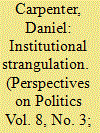

|
|
|
|
|
| Publication |
2010.
|
| Summary/Abstract |
The politics of financial reform represent a genuine test case for American politics and its institutions. The Obama administration's proposed reforms pit common (largely unorganized) interests against well-organized and wealthy minority interests. I describe how the withering and unfolding of financial reform has occurred not through open institutional opposition but through a quieter process that I call institutional strangulation. Institutional strangulation consists of much more than the stoppage of policies by aggregation of veto points as designed in the US Constitution. In the case of financial reform, it has non-constitutional veto points, including committee politics and cultural veto points (gender and professional finance), strategies of partisan intransigence, and perhaps most significantly, the bureaucratic politics of turf and reputation. These patterns can weaken common-interest reforms, especially in the broad arena of consumer protection.
|
|
|
|
|
|
|
|
|
|
|
|
|
|
|
|
|
|
|
|
|